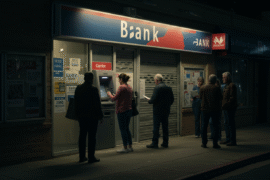This article may contain references to products or services from one or more of our advertisers or partners. We may receive compensation when you click on links to those products or services. Nonetheless, our opinions are our own.
The information presented in this article is accurate to the best of our knowledge at the time of publication. However, information is subject to change, and no guarantees are made about the continued accuracy or completeness of this content after its publication date.

Updated by Albert Fang
The delisting of Binance USD (BUSD) has catalyzed a notable shift in the online gambling industry towards the stablecoin USD Coin (USDC). This preference for USDC is driven by its stability and compliance with regulatory standards, marking a significant change in digital currency use within high-risk sectors. For further details on the effects of USD Coin gambling sites, continue reading.
Overview Of USDC And BUSD
USD Coin, often called USDC, is digital money worth about one US Dollar. This is because, for every USDC, there’s a real dollar kept safely in a bank. These banks are checked regularly to ensure that for every USDC, there is indeed a dollar in reserve. This setup helps keep USDC’s value steady, making it a reliable choice for digital transactions.
USDC operates on various blockchain platforms, including Ethereum and Solana, and is integrated into smart contracts, allowing for versatile applications in decentralized finance (DeFi), e-commerce, and online payments. The stablecoin is widely accepted in the cryptocurrency ecosystem, facilitating international transactions and reducing fees.
Binance USD (BUSD), another stablecoin, faced delisting due to regulatory pressures and scrutiny from financial regulators. This highlights digital currencies’ ongoing challenge in aligning with existing financial laws and regulations. The delisting of BUSD from several platforms, including Binance, reflects the increasing efforts of regulatory bodies to control the cryptocurrency market.
The rise in demand for USDC, especially in the online gambling industry following BUSD’s delisting, indicates a shift towards stable, regulatory-compliant digital currencies. Cryptocurrencies, including stablecoins like USDC, offer significant benefits for online gambling, such as quick transactions and anonymity.
The stability of USDC makes it particularly attractive in the gambling sector, where value preservation is crucial. This trend underscores the evolving relationship between cryptocurrencies and high-stakes sectors like online gambling, where digital currencies’ stability and regulatory compliance are increasingly valued.
The Delisting of BUSD
The delisting of Binance USD (BUSD) from various platforms, including Binance, was primarily driven by Paxos’ decision to halt the minting of new BUSD tokens. This decision had a significant impact on the stablecoin’s availability and circulation.
In response, Binance announced plans to gradually phase out support for BUSD by February 2024, encompassing various services like trading and withdrawals, with specific timelines leading up to the final deadline.
This announcement led to immediate market reactions, primarily involving the transition of users from BUSD to other stablecoins. Binance facilitated this shift by offering zero trading fees for conversions to alternative stablecoins, like First Digital USD (FDUSD).
The delisting also brought regulatory scrutiny to the forefront, particularly regarding Paxos, which faced an investigation by the New York Department of Financial Services.
From a regulatory and industry perspective, concerns over liquidity and regulatory compliance played a crucial role in the decision to delist BUSD. Exchanges like Coinbase also delisted BUSD, citing liquidity concerns following Paxos’ decision to stop minting the stablecoin.
The event marks a significant shift in the crypto ecosystem, highlighting the importance of regulatory compliance for stablecoins and the adaptability of major crypto platforms to evolving market dynamics and regulatory pressures.
Voted "Best Overall Budgeting App" by Forbes and WSJ
Monarch Money helps you budget, track spending, set goals, and plan your financial future—all in one app.
Get 50% OFF your first year with code MONARCHVIP
Impact on USD Coin (USDC)
Following the delisting of Binance USD (BUSD) from significant exchanges like Coinbase, the market performance of USD Coin (USDC) experienced some fluctuations, albeit less drastic than BUSD.
In the fluctuating world of cryptocurrencies, BUSD’s market cap dramatically plunged from its zenith of $23.49 billion to $9.66 billion. In contrast, USDC displayed a more resilient trend, with only a slight dip in its market cap from $42.3 billion to $41.5 billion, a testament to its relative stability in the volatile crypto landscape.
The delisting of BUSD, attributed to regulatory pressures and non-compliance with Coinbase’s listing standards, created a shift in the stablecoin landscape.
This shift has potentially contributed to an increased demand for USDC in the gambling sector. The factors influencing this surge include the regulatory compliance and perceived stability of USDC, making it a preferred option in markets where trust and reliability are paramount.
Comparatively, other stablecoins like Tether (USDT) responded differently to these events. USDT’s market cap increased from $67.8 billion to $70.1 billion, indicating a varied response among different stablecoins to the delisting of BUSD. These developments highlight the interconnectedness within the cryptocurrency market and the significant impact of regulatory actions on the dynamics of this landscape.
Gambling Industry’s Shift to USDC
The gambling industry increasingly incorporates USD Coin (USDC) as a preferred currency, mainly due to its stability and reliability. As a stablecoin, USDC’s value is pegged to the US Dollar, offering a less volatile alternative to traditional cryptocurrencies like Bitcoin. This shift is evident in platforms such as FortuneJack, which have embraced USDC, providing users with bonuses and favourable transaction terms. These developments demonstrate a growing acceptance and comfort of digital currencies in gambling.
Regulatory changes are also influencing the adoption of digital currencies in gambling. Notably, new legislation is being introduced in jurisdictions like Curacao to enhance oversight in the online gambling sector. Establishing the “Curaçao Gaming Authority” (CGA), overseeing gaming operations and issuing licenses, is a significant step in this direction. This move towards stricter regulation might impact the usage of digital currencies like USDC in online gambling.
Industry experts, including those from Global Gaming Solutions, observe that these regulatory changes might prompt gambling operators in regions like Curacao to move to jurisdictions with more robust regulatory frameworks, such as the Isle of Man. The Isle of Man offers a comprehensive and reputable regulatory environment for online gambling, potentially providing a more stable context for using digital currencies.
The adoption of USDC in online gambling comes with several benefits. It assures reduced volatility, offers fast and secure transactions, facilitates easy access to other cryptocurrencies, and enjoys robust support from key players in the crypto industry. However, challenges such as adapting to the evolving regulatory landscape, varying acceptance levels of USDC across different platforms, and the need for technological infrastructure and expertise to integrate USDC into gambling systems persist.
Conclusion
The shift from Binance USD (BUSD) to USD Coin (USDC) in the gambling industry highlights the growing preference for stable and regulatory-compliant digital currencies. USDC’s stability and peg to the US Dollar make it an attractive choice for online gambling, reflecting the sector’s need for reliable and secure digital payment options. This trend is a significant indicator of the evolving relationship between cryptocurrency and the regulatory landscape, especially in industries like online gambling, where the stability and legitimacy of digital currencies are crucial.

Reviewed and edited by Albert Fang.
See a typo or want to suggest an edit/revision to the content? Use the contact us form to provide feedback.
At FangWallet, we value editorial integrity and open collaboration in curating quality content for readers to enjoy. Much appreciated for the assist.
Did you like our article and find it insightful? We encourage sharing the article link with family and friends to benefit as well - better yet, sharing on social media. Thank you for the support! 🍉
Article Title: Unveiling the Ripple Effect: USD Coin’s Surge in Gambling Demand Post BUSD Delisting
https://fangwallet.com/2024/01/06/unveiling-the-ripple-effect-usd-coins-surge-in-gambling-demand-post-busd-delisting/The FangWallet Promise
FangWallet is an editorially independent resource - founded on breaking down challenging financial concepts for anyone to understand since 2014. While we adhere to editorial integrity, note that this post may contain references to products from our partners.
The FangWallet promise is always to have your best interest in mind and be transparent and honest about the financial picture.
Become an Insider

Subscribe to get a free daily budget planner printable to help get your money on track!
Make passive money the right way. No spam.
Editorial Disclaimer: The editorial content on this page is not provided by any of the companies mentioned. The opinions expressed here are the author's alone.
The content of this website is for informational purposes only and does not represent investment advice, or an offer or solicitation to buy or sell any security, investment, or product. Investors are encouraged to do their own due diligence, and, if necessary, consult professional advising before making any investment decisions. Investing involves a high degree of risk, and financial losses may occur including the potential loss of principal.
Source Citation References:
+ Inspo










































